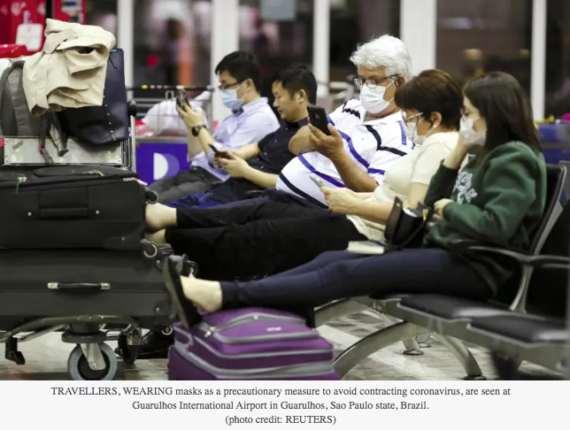
The Jerusalem Post
By Marc Schneier
February 13, 2020
As a Jew, the upsurge of anti-Chinese bigotry triggered by the coronavirus brings back painful memories of medieval Europeans blaming Jews for the spread of the Black Death.

Fear of the supposed “Yellow Peril” is back big time.
The rapid spread of the coronavirus from its point of origin in Wuhan, China, where the first confirmed case was documented on December 31, to more than a dozen countries around the world has understandably sparked concern in many parts of the globe. However, the emergence of the new disease, which manifests pneumonia-like symptoms and infects the respiratory tract, has also unleashed another virulent disease from decades past: anti-Chinese racism.
In the late 19th and early 20th centuries, when high levels of immigration from China and other East Asian countries to the US and other Western countries took place, periodic outbreaks of diseases originating in the Far East brought a hysterical counter-reaction about a supposed yellow peril threatening the health and well-being of the host societies. We are now seeing a similar wave of fear and hostility directed at people of Chinese and East Asian origin even in cosmopolitan cities in countries like the United States, France and Australia.
Bigoted talk about Chinese supposedly spreading the virus has been greatly amplified by social media. As Russell Jeung, chair of Asian-American Studies at San Francisco State University, told USA Today: “If you look at social media, it’s fear of the yellow peril all over again. ‘Coughing while Asian’ is like ‘driving while black,’ something you get stereotyped for.”
Noting that a growing number of Chinese-Americans are wearing face masks for fear of contracting coronavirus, Jeung added, “The masks are there for courtesy, but instead they are viewed in different ways.”
First, a little perspective: While the coronavirus has indeed spread rapidly – with 24,000 cases reported worldwide, including 11 cases confirmed in the US and 492 confirmed deaths, with the vast majority in China – we must remember that these still tiny numbers in a world of eight billion people.
The number of coronavirus cases in China is already greater than the number of cases of the SARS virus of 2002-2003. SARS ultimately killed 774 people around the world. Yet, the chances of an American dying of coronavirus is infinitesimal, compared to his or her chances of dying of flu, cancer, stroke, car accidents or drug overdoses. In short, there is no justification for panic.
As a Jew, the upsurge of anti-Chinese bigotry triggered by the coronavirus brings back painful memories of medieval Europeans blaming Jews for the spread of the Black Death and other plagues, and sometimes massacring them as a result. Thankfully, nothing that awful has so far happened to Chinese-Americans, but the potential for such horrors is there. In 1900, the Board of Health in Honolulu – beset by an outbreak of bubonic plague – intentionally set a fire in Chinatown that destroyed 38 acres and 4,000 homes.
The present eruption of anti-Chinese prejudice will certainly be inflamed by a shocking rise of bigotry, xenophobia and white nationalism in this country, which has been characterized by mass shootings of Jews at prayer at synagogues in Pittsburgh and San Diego and similar attacks on other minorities, including African Americans, Hispanics, Muslims and gays. As victims of these atrocities, American Jews must state an emphatic no to the spread of fear and loathing against Chinese-Americans. We know in the depths of our hearts exactly where such incitement can lead.
Back in the 1930s and 1940s when Nazi Germany unleashed persecution and eventual mass extermination upon European Jewry, tens of thousands of Jewish refugees managed to escape to China. Most of them lived in Shanghai under ghetto-like conditions imposed by the-then Japanese overlords of the city, who were seeking to placate their Jew-hating German allies.
By all historical accounts, the Shanghai Jews lived amicably with their Chinese neighbors who, like them, were living in conditions of poverty. Among those who survived in Shanghai were 400 teachers and students from the Mir Yeshiva in Lithuania. Without the friendship of the Chinese in those years, this venerable hassidic dynasty might not have survived.
We should gratefully remember the kindness and hospitality shown by the Chinese people to the remnant of European Jewry which managed to arrive on their soil. Let us show Chinese-Americans the same kindness and hospitality today, according to the timeless aphorism in Deuteronomy 10:19: “You shall also love the stranger, for you were strangers in the land of Egypt.”
As Jews and people of conscience, we must rise to the challenge and reach out a hand of solidarity with our Chinese-American brothers and sisters.
The writer is president of the Foundation for Ethnic Understanding.
Copyright © 2025 Foundation For Ethnic Understanding. All rights reserved. | Privacy Policy